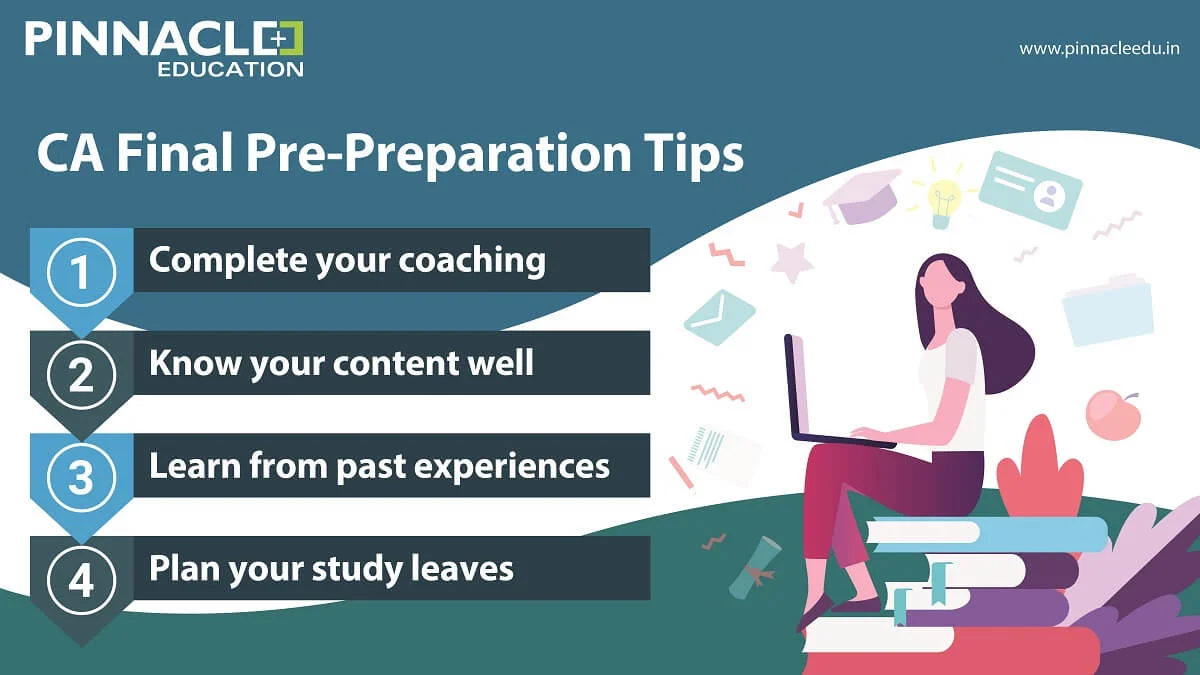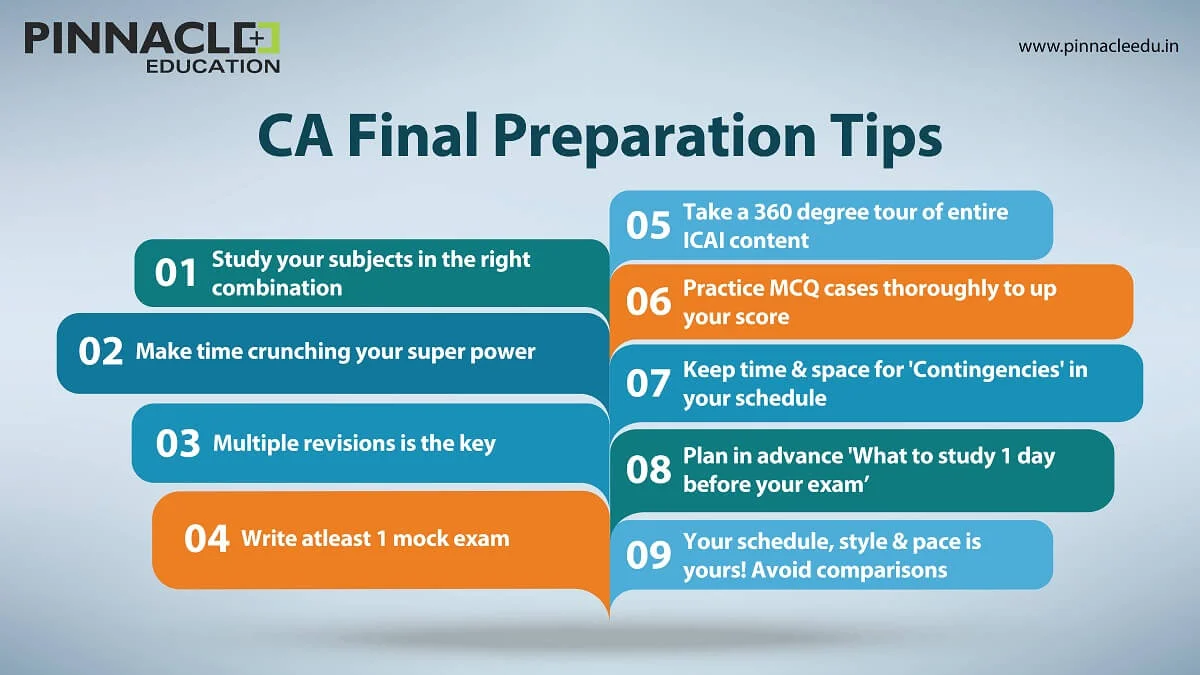The CA final preparation for the exam may be a tough hill to climb, but it surely isn’t unworkable. The promise of a terrific future ahead seems like enough motivation to put in more than 100%.
The journey for the CA final preparation seems like a series of trial and error, with little to no margin for error. While there is no sure shot way to ace probably the most demanding exam of your educational life, a well-planned approach is your recipe to sail through.
Here are a few pointers by us, divided into 2 major parts – the points we recommend you to be ready with prior to planning and the points that have to be kept in mind while planning the timetable:
Pre-Preparation before your Study Leave:

- Complete your Coaching: You should have completed/ be on the verge of completion of your classes at least 5 – 6 months before your attempt. Ensure that you have a brief idea about what each subject entails by thoroughly going through the material at hand at least once.
- Know your content well: The ICAI material should be your ‘blind man cane’ to help you navigate through the various subjects Go through the Module, past 4 – 5 attempt past papers, at least the last 3 RTP, MTP, & any additional reference material provided by the ICAI for the particular subject If you are using any coaching provider’s material, ensure that it is comprehensive in its coverage by cross checking it with ICAI material. Be sure that you are ready with the ‘where’s’ and the ‘how’s’ of each topic within the subjects before you get to the ‘when’s’.
- Learn from past experiences: The best people to guide you are your seniors who have experienced the exam recently. Their experiences will help you understand the Do’s & Don’ts of the exam & enable you to minimize the trial and errors. But remember, what worked in their favor may not necessarily work in yours. Nonetheless, they may play a great role in keeping you motivated through the study leave phase.
- Plan your Study Leaves: The most important step in preparing a timetable is being aware about the number of days in your hand. Read up your organization’s policy well in advance so that you manage your study planning accordingly.
Preparation during your Study Leave:

We understand that the journey of CA Final feels daunting in the start and sky is the limit for being prepared, but it can get a little easier by planning it to the T. Follow the below tips to get a head-start:
- Compartmentalize and Prioritize: Break down your entire portion into groups of subjects (Practical and Theory). Segregate these subject groups into tinier chunks. Ensure that you keep sufficient time for an exhaustive first study – around 90-100 hours/subject. It is recommended that you take up at least 2 subjects a day & preferably a combination of Practical & Theory.*Pro Tip – Going through all your material, including Institute material, RTPs, MTPs, in the first read, lets you feel in control of the subject for the future.
- Make time crunching your superpower: Know which topics are a must-do as per ICAI (Ref. Link) and more importantly, know which topics will YOU need extra effort in. Accordingly, decide on how much time to allot to the various topics.
- Revise and then re-revise: Incorporate in your timetable slots for revision – we would recommend 2 revisions for a thorough knowledge of the topics. Quickly glance through topics you studied in the day before wrapping up.*Pro Tip – Stay current on your amendments by scheduling the subject more prone to amendments for later.
- Time: The number of hours you dedicate per day should gradually increase. It may be fair to plan more frequent breaks and smaller study slots in the beginning to set yourself in motion. We would recommend starting off with 9-10 hours a day and eventually escalating it to 12-15 hours at your peak.
- Customize YOUR pace: The most effective tip of all – consider YOUR study style before setting up a timetable. A recommended timeline for the revisions is given below; this incorporates a third revision which preps you right up to the final exam period.
First Study Second Read Third Read Around 90 hours/subject Around 45 hours/subject Around 18 hours/subject 2.5 to 3 months 1.5 months Half a month 2 to 3 subjects/day 1 to 2 subjects/day 1 subject/day -
Buffer Periods: We understand that the CA final study-leave journey can get erratic and it may be hard to collect yourself together on some days. There may be extended delays in studying a subject v/s what was planned, or sometimes personal emergencies may take over & hamper your planned schedule.
Well, this is a very normal experience with everyone & must not panic you, Hence it is wise to incorporate a buffer periods in your planning so that your study schedule is realistic.
-
Summarize your way through: Theory topics are more effectively memorized by writing them down. Revision becomes much simpler when you have to read a summarized version of the notes. Make sure you jot down a summary in your first read to help you accelerate your pace in the ensuing revisions. These mind maps of each topic will come very handy a day before the exam.
*Pro Tip – Record your understanding of comparatively complicated topics through voice notes so that you don’t waste time on them again.
-
Mock Exams: The CA exams can well be described as a game of chess – the best trick to know your way through exams is practice. Mock exams can give you an idea of what’s to come – the nerves before the exam, recollecting and associating questions to the related topics, the anxiety of not knowing, your speed – having a hold on the type and style of questions will aid you in being prepared for the main exam.
*Pro Tip – We recommend giving at least 2 mock exams.
However, the mock result should be taken with a pinch of salt as it may not be truly representative of ICAI’s exam papers/ checking style.
-
MCQs and Case Studies: Students tend to look at these as easy marks and adopt a lazy approach. However, ICAI has adopted an increasingly technical approach to MCQs and Case Studies and cracking them in a timed scenario can be a task. Make sure you practice well on these and don’t lose out on marks.
The D-Day:
The 1.5 days prior to your exam is simply for collecting and assimilating your knowledge about each subject – avoid learning new concepts/solving new questions then. However, make sure you don’t skip any topic – you never know what awaits you. Calm your nerves and keep your mind at peace on the day of the exam
Stay connected with us for more on this in the next blog ‘What to do One day Before the Exam’!
Some more quick tips…..
A few simple tips that will help you calm your nerves, keep you composed & avoid burnouts which is very very important.
- Pick two study spots – for the first session and the second. This ensures you don’t experience boredom studying in one place.
- Relax in your breaks by having a chat with family/ friend, meditating, listening to music – steer away from any kind of books/ reading, preferably avoid excessive screen exposure
- Keep Sunday evenings free to rest & unwind.
- Stick to a nourishing diet and avoid oily meals that may upset your belly, make you drowsy and ruin your mood
- Rest well by sleeping for 6-7 hours – NEVER compromise on a good sleep
- Stay fit by going for a run or working out/ Doing Yoga
- Stay hydrated at all times
- Do not compare yourself with your friend studying for the exam. Each one has a different process & none is right or wrong. What works for you, works only for you.
Make sure to keep YOUR SWOTs in mind while planning all of it and you’ll be good to go!
That’s all from our end for now! Good luck in getting the ball rolling!
